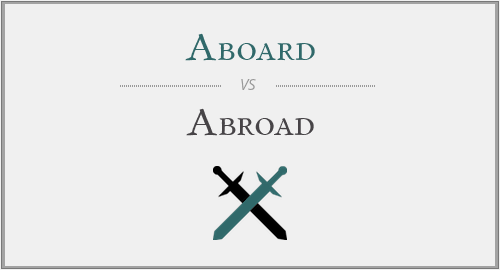
1. Aboard
The term "aboard" primarily functions as an adverb or preposition, indicating being or going on board a vessel, aircraft, or vehicle. It refers to being physically present or moving within a mode of transportation. For instance:
- "The passengers climbed aboard the ship."
- "We were excited to be aboard the train to our destination."
- "She went aboard the plane for her international flight."
In these examples, "aboard" is used to convey the sense of being on or within a vehicle or vessel.
2. Abroad
In contrast, "abroad" functions as an adverb and refers to being in or to a foreign country or in a place that is far from one's home or familiar surroundings. It denotes the concept of traveling or residing outside of one's own country. Examples include:
- "They decided to go abroad for their honeymoon."
- "He studied abroad to immerse himself in a different culture."
- "She dreamt of traveling abroad and experiencing new adventures."
Here, "abroad" indicates the idea of being in a foreign land or venturing beyond one's home country.
3. Distinctions and Usage
The key distinction between "aboard" and "abroad" lies in their specific contexts. While "aboard" focuses on being within or on a vehicle or vessel, "abroad" emphasizes being in a foreign country or far away from one's usual residence. It is essential to use these terms accurately to avoid confusion and convey one's intended meaning effectively.
Additionally, "aboard" is typically used in combination with verbs related to transportation, such as "get," "go," "climb," or "be." On the other hand, "abroad" is often used in combination with verbs related to travel, study, or live, indicating a broader sense of exploration and cultural immersion.
Conclusion
Clear communication is vital, and understanding the distinctions between similar-sounding words is crucial in the English language. "Aboard" and "abroad" may sound alike, but their meanings and usage diverge significantly. By recognizing the nuances between these terms, we can effectively communicate our experiences of being on board a vehicle or exploring foreign lands. Let us embrace the richness of language and strive for precision in our expressions, ensuring that our words accurately convey our intended messages.




Have a discussion about this article with the community:
Report Comment
We're doing our best to make sure our content is useful, accurate and safe.
If by any chance you spot an inappropriate comment while navigating through our website please use this form to let us know, and we'll take care of it shortly.
Attachment
You need to be logged in to favorite.
Log In